Explore the latest news and find out what's on this month
Explore our learning offer for schools, families and community groups
Uncover the rich history of Elmbridge with our latest online exhibitions
Want to discover more about your local area?
Explore the latest news and find out what's on this month
Explore our learning offer for schools, families and community groups
Uncover the rich history of Elmbridge with our latest online exhibitions
Want to discover more about your local area?
My name is Lucie and I am studying for a Masters degree in Museums, Galleries and Contemporary Cultures at the University of Westminster.
I approached the Elmbridge Museum to ask if they had any volunteering positions available so I could build on my experience of working in the museum sector. I spoke with Amy, the Exhibitions & Interpretation Officer, and she informed me of an exciting project named Everyday Heroines. In our initial meeting we discussed the exhibition brief and I felt a strong connection with the intended message behind the content.
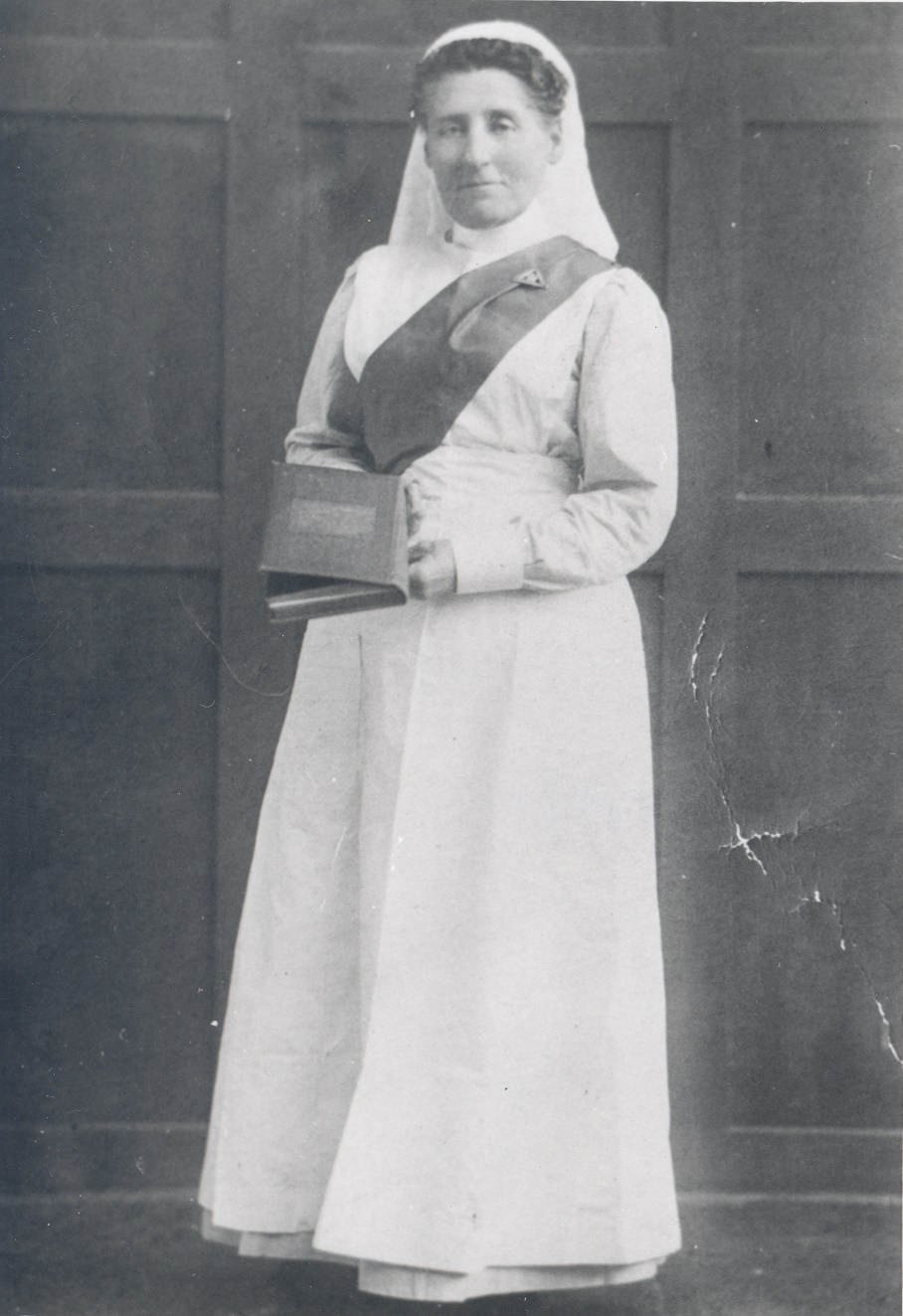 An unnamed First World War nurse from Weybridge. We wanted to tell the stories of more ‘everyday’ female experiences like this in Everyday Heroines.
An unnamed First World War nurse from Weybridge. We wanted to tell the stories of more ‘everyday’ female experiences like this in Everyday Heroines.
I had read Amy’s blog post titled Women’s History Month: The Good, the Bad and the Ordinary and appreciated the idea that we can inspire young girls by sharing the stories of the courageous women who came before them. From the suffragette’s ‘Votes for Women’ to the Spice Girls’ ‘Girl Power’, women have fought for centuries for their successes and contributions to society to be recognised. History is often told from the viewpoint of the powerful and, for a long time, positions of power were held by men.
Amy and I discussed that we wanted to highlight women in Elmbridge’s untold stories. The Museum already has an online exhibition titled ‘People of Elmbridge’ which explores some of the famous and noteworthy people of the borough. However, we didn’t want to focus on the wealthy, royalty or nobility who have lived in Elmbridge.
Everyday Heroines was a chance to tell stories that the audience could relate to or feel inspired by. My current museum studies course looks at how museums can impact people’s lives by sparking connections, conversations and pride. We wanted to move away from the obvious stories and delve deeper.
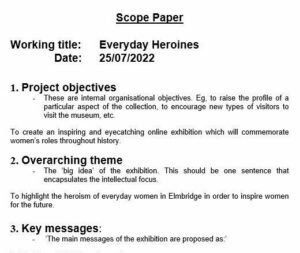
A snapshot of the scope paper.
An essential step in planning the exhibition was to complete a scope paper; this set out the objectives of the exhibition and the overarching message we wanted to convey. Through telling these stories, we want to encourage women to recognise and celebrate their own accomplishments and hard work. It was important to highlight that success and value is not dependant on fame and money and that working hard for your family and your community makes you a heroine too. Our scope paper allowed us to structure and plan the key themes we wanted to cover: I felt that it would be useful to look at events and issues that affected all women at the time and are still poignant in the world today: education, working life, wartime efforts and social advancement.
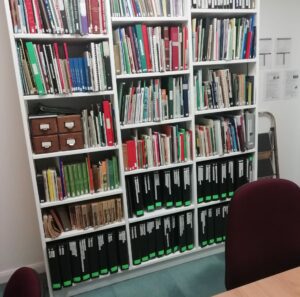
Some of the resources in the Local Studies room.
I began by looking through a range of local history websites; I was delighted to see the passion that Elmbridge citizens have for their history and found a wealth of information about local women and their experiences. I compiled a list of women whose stories I found inspiring and who were not mentioned fully in the museum’s existing exhibitions. The Museum also has a fantastic local studies room at their office which is filled with useful books, historic newspaper cuttings, leaflets and photographs. I used social history books and first-hand accounts to research and build my knowledge of these women’s stories and the world they were living in at the time. I also gained an understanding of women’s history in general in terms of how women were educated, when they fought for the right to vote and how they embraced the shift in gender roles during the two World Wars.
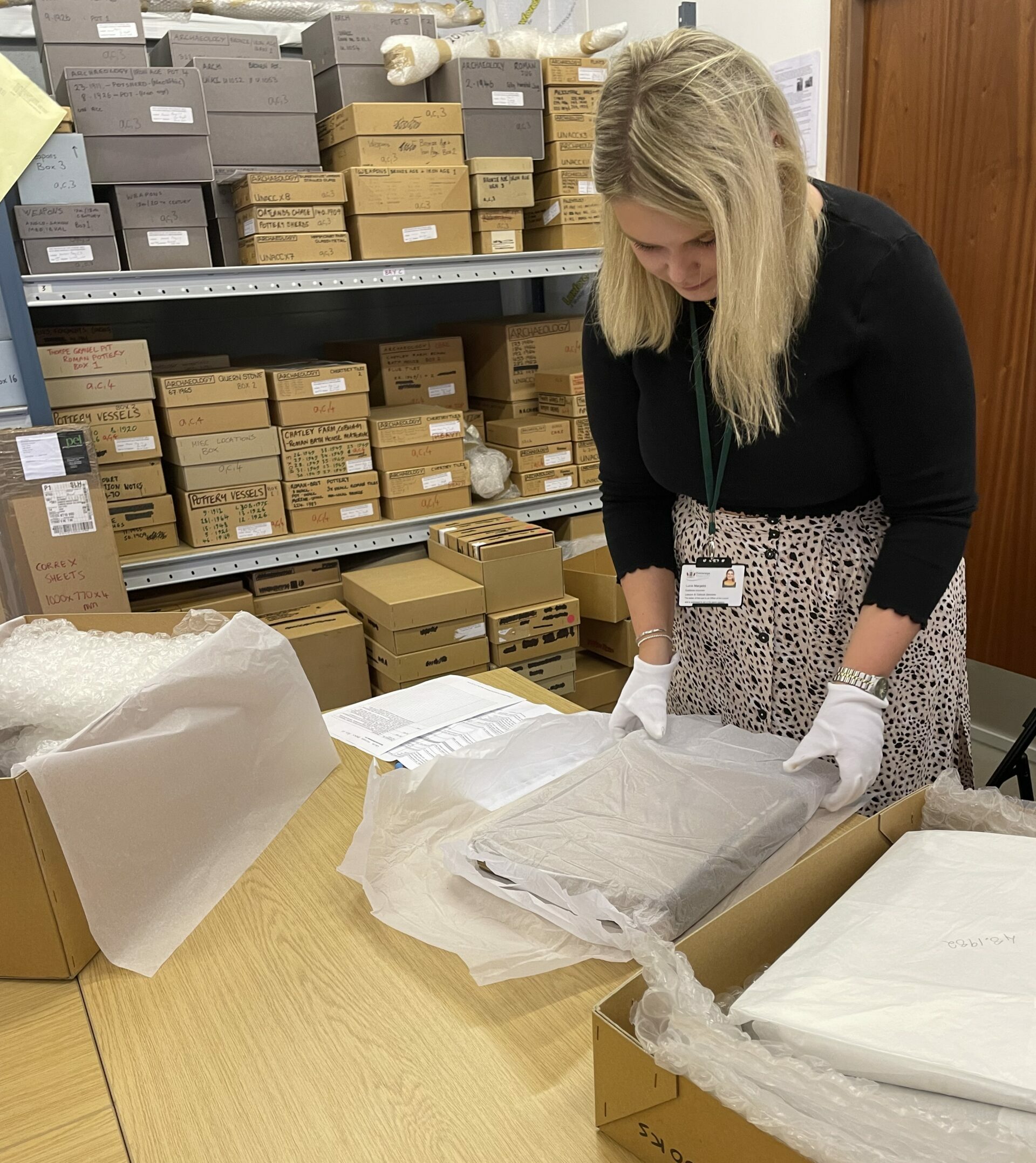 Photograph of Lucie looking through a box in the museum's stores.
Photograph of Lucie looking through a box in the museum's stores.
Following my initial research, I began to search through the museum’s collections database which is an online catalogue of all the objects stored and conserved by Elmbridge Museum. I received training from Amy on how to search and utilise the system, finding interesting objects that either belonged to the women on my list, or complemented and gave context to their stories. Once I had identified some key objects, I created a ‘longlist’ spreadsheet detailing their location in the museum stores. This information can be found in each object’s entry page on the collections database and allows you to locate objects easily when at the stores. I valued this training immensely and appreciated the Collections Officer’s excellent organisation and attention to detail.
We then spent a few days in the museum stores; I was trained on how to find objects, handle them correctly and then repackage them in line with museum policy. It was essential to wear gloves so as not to damage the artefacts and handle them with the utmost care. Amy also demonstrated how they photograph objects for online exhibitions, and I was able to have a go at this myself. We also filmed some behind the scenes videos, giving the audience an insight into how the museum stores look and operate. I absolutely loved being surrounded by historical objects, inspecting them closely and understanding these women’s stories through their belongings. I can’t thank Amy and the Museum enough for this incredibly valuable opportunity for my future career and as a history and museum enthusiast.
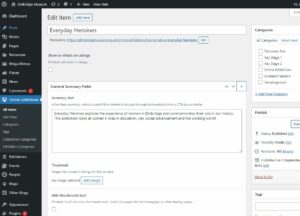
Editing the Everyday Heroines online exhibition on Elmbridge Museum’s website management system.
Amy had explained to me that Elmbridge Museum does not have one physical gallery space as many other traditional museums do, instead maintaining display spaces at a range of community venues across the borough, such as libraries, Xcel Leisure Complex and the Civic Centre . Because of its flexible ‘outreach’ nature, the Museum make particular use of their newly developed website, as a permanent home for online exhibitions. Once I had concluded my research and photographed my objects at the museum stores, Amy taught me how to create a webpage for the information to go on. Museums across the UK are making a conscious effort to create more online resources so they are accessible to a wider audience, as many people are not able to attend in person, due to physical limitations. It was great to see that the Elmbridge Museum was doing this as well. I began to design my online exhibition page, adding in the information and objects which told these everyday heroines’ stories. We edited my behind the scenes videos and Amy suggested that I write this blog to talk about my first experience of contributing to a museum exhibition. It was important to make the page dynamic and interesting to attract as wide an audience as possible. We wanted the content to be valuable to local historians, women’s groups and young children alike.
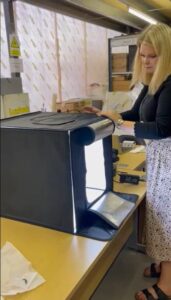
Photograph of Lucie setting up the lightbox to photograph objects in the museum’s stores.
The exhibition is now published on the Elmbridge Museum webpage and I am so pleased with the final result. I hope that our audience can appreciate the work of these women and how they have contributed to the opportunities that we have today. We owe the women who came before us for our right to vote, work, educate and explore. I particularly wanted to include Avril Lansdell and Ethel Harting in the exhibition due to their work in the museum sector. Traditionally, museums of the 19th century tended to be places of elitism reserved for men and their education. It is thanks to women like Avril and Ethel that I am able to break into this vocation myself. Through this project, I hoped to elaborate on our society’s existing history, written by men and often skimming over the contributions of women. Women can be whoever they want to be; housewives, mothers, activists or politicians. Each holds value and can improve our society through hard work and genuine care for each other. I hope that Everyday Heroines helps you to reflect on who your heroines are, what they mean to you and what you can do to be a heroine in your own life.
My own takeaways from this project are that women’s care and bravery know no bounds. I appreciate my own mother’s dedication to the teaching profession and how her hard work has opened up opportunities for my sister and I. I value my female friends and their drive and motivation towards excellent jobs and platforms for their voices. I appreciate women who march and fight for women’s safety, equality and freedom outside of the UK. I appreciate men who understand these issues and are allies in these fights. Finally, I appreciate those who read this blog and engage with our Everyday Heroines exhibition; I hope you find it interesting and inspiring. I certainly did.
In this video, Lucie demonstrates how to retrieve items from the Elmbridge Museum stores, and shows how we photograph them using the lightbox.
Find out more about the featured Women's Land Army badge in Lucie's exhibition